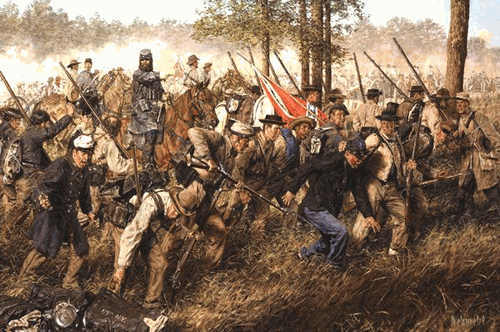  
"Press Forward, Men"
Thomas Jonathan Jackson was much more than a brilliant military campaigner and tactician. He was a devoted Christian, family man, leader and patriot, and it is more than fitting that his fame should have spread as widely as it did. In the words of English clergyman S. Parkes Cadman, “His alliance with eternal realities, his foretaste of the powers of the world to come, his deep and genuine piety, his adgerence to the Bible, the Church, and the Lord’s day, his keeping of his own conscience before God and men, are the outstanding traits of a spiritual prince who was greater than anything he did, and whose deeds took rise in his being.”
In painting Stonewall Jackson at the apogee of his greatest military triumph at Chancellorsville, I have frozen him in a moment of time, in an aggressive, urgent posture, that I think epitomizes the image and attitude of the General which endeared him to his men and to the patriotic hearts of Southerners, and which struck fear and awe into the hearts of his enemies. He is seen in my picture among his troops, urging them onward with a favorite phrase: “Press forward, men!”, in the midst of the brilliant flank attack which had the Orange Turnpike as its axis of advance. Jackson was desperate to convey the urgent need to maintain the momentum of the assault which, by the moment depicted in my painting, was flagging. Daylight was in short supply, as evidenced by the pale orange moon under which Jackson and his party of reconnoitering officers would be fired upon by a regiment of jittery North Carolina soldiers a few hours later, with extremely dire consequences.
The men of Jackson’s second Corps, Army of Northern Virginia, had marched all day in unabating heat and dust, with little water and little food, through densely wooded country over roads that at places were little more than footpaths, to assemble for and mount an attack on an enemy that never suspected a general engagement would ensue that day, until the Confederates were upon them and the enemy right flank had collapsed entirely.
The scene as I have portrayed it shows the Confederate assault about an hour and a half after its commencement at 5:15 PM on May 1, 1863. Jackson had the artillery in the dusty background of my picture brought up to assume a forward firing position in the hopes of maintaining the offensive. The fight had reached a critical stage, a the right wing of the Army of the Potomac, under the command of Major General Joseph Hooker, did eventually regain its composure, and mounted a spirited defense. Despite being caught completely off guard, Major General Oliver O. Howard’s Eleventh Corps succeeded in inflicting 1,000 casualties on Jackson’s men and stalling his advance.
It was Jackson’s ultimate aim to cut off Hooker’s army from its routes of retreat across the Rappahannock River and, if possible, capture the bulk of the Army of the Potomac. In his intense zeal to accomplish this goal by a renewed assault under the light of a full moon, Jackson and a party of officers, led by a local scout, undertook a night reconnaissance ahead of his army’s lines, in “no man’s land”. As they were returning to
Their own lines, a fusillade of lead poured out upon them. A regiment of nervous and exhausted soldiers, the 18th North Carolina, had mistaken Jackson and his staff for Federal cavalry probing their front.
Jackson, struck by three bullets, had to be helped from his horse and carried through his lines on a stretcher, past the anguished soldiers through whose ranks the tragic news would eventually ripple like a shock wave. Jackson’s shattered left arm was amputated in the small hours of the following morning, and though eventually it appeared that his condition had stabilized and the General would survive, pneumonia set in, his condition became critical, and finally, on Sunday, May 10, 1863, at 3:15 in the afternoon, Thomas Jonathan Jackson passed on, “Crossed over the river, to rest in the trees.”
One of the innumerable eulogies t Jackson, by Judge George L. Christian, expressed the thoughts of many:
A hero came among us, as we slept;
At first he lowly knelt, then rose and wept,
Then gathering up a thousand spears,
He swept across the field of Mars,
Then bowed farewell, and walked among the stars,
In the land where we were dreaming.
Massachusetts private Franklin S. Wright, in a letter to his mother, put it into far simpler words:
“We shall fear him no more.”
Image Size 20"x30"
|